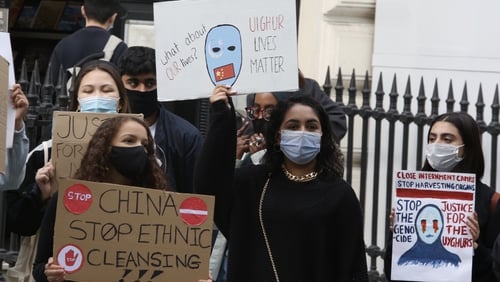
EU asks China to let observers visit Xinjiang
The EU has asked China to grant independent observers access to its Xinjiang region, where Beijing is accused of orchestrating widespread rights abuses against the region's Muslim Uighur population.
EU Council President Charles Michel said the call was made during a video conference with Chinese President Xi Jinping, where EU concerns about Beijing's new security law for Hong Kong were also raised.
While the meeting focused on trade and climate change, Mr Michel said the European side had not shied away from thorny rights issues.
"We reiterated our concerns over China's treatment of minorities in Xinjiang and Tibet, and the treatment of human rights defenders and journalists," Mr Michel said.
"We asked for access for independent observers to Xinjiang and we called for the release of the arbitrarily-detained Swedish citizen Gui Minhai and two Canadian citizens."
The meeting took the place of a full in-person summit with all 27 EU leaders that had to be cancelled because of the coronavirus pandemic.
Rights groups, academics and journalists have documented a harsh crackdown against Uighur and Kazakh Muslims in Xinjiang, including mass internments, enforced sterilisations, forced labour as well as intense religious and movement restrictions.
Activists say roughly one million Uighurs and others have been incarcerated in brainwashing camps.
China describes the camps as vocational training centres and says it is seeking to provide education to reduce the allure of Islamic radicalism.
The EU, which has said that the measures taken in Xinjiang are "disproportionate" to any claim to be fighting terrorism, has called in the past for observers to be given access to the region, to no effect.
The video meeting between Mr Michel, Mr Xi, European Commission President Ursula von der Leyen and German Chancellor Angela Merkel also touched on Hong Kong, where the West fears key freedoms are being eroded.
"The national security law for Hong Kong continues to raise grave concerns.
"The EU and our member states have responded with one clear voice -- democratic voices in Hong Kong should be heard, rights protected, and autonomy preserved," Mr Michel said.
"We called on China to keep their promises to the people of Hong Kong and the international community."
After another video summit in June, Ms von der Leyen warned China would face "very negative consequences" if it pressed ahead with the law and a month later the EU limited exports to Hong Kong of equipment that could be used for surveillance and repression.